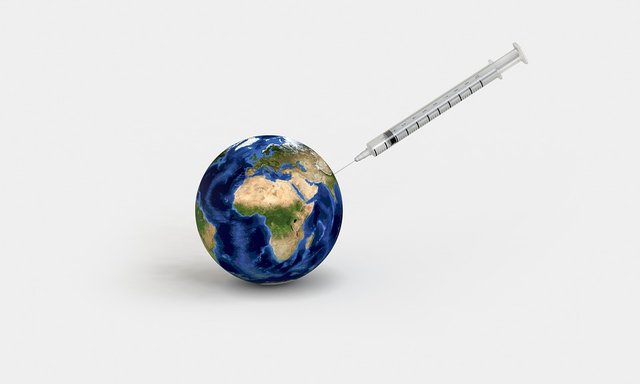I never thought I'd be starting an article by pasting a dictionary definition, neither I've ever thought I'd be writing in a blog to be read by a lot of people (and voted by bots)... So, I guess there's a first time for everything! (I keep finding out that I did a lot of things I said I would never do as life passes by).
Of we look for "success" in the dictionary we find:
b : favorable or desired outcome; also : the attainment of wealth, favor, or eminence.

As a species, we can risk saying that success is reproduction, a lot of reproduction. We, humankind, did pretty well at that. We populated the entire planet, even the extreme environments. Anyways, human groups (thanks to one or another factor) grew separated from each other -if we look at the entire picture-.
This isolation helped pathogens that attack individuals and their immune system to evolve in a radically different way depending on the location. Then, the mere fact of having a perfectly evolved immune system that can fight off a pathogen in the population "X" does not grant you immunity against pathogens in the population "Z". Because (natural selection at its best) only the best ones prevailed in each region.
Two of those well documented events were during 1914 and 1939 (first and second world wars) where; besides weapons, bombs and all those evident demonstrations of waste of human intelligence; we faced invisible agents that were even more dangerous. It ia said that the winner in war is not the one with better gear or with a better strategy, the winner is the one that carries the most lethal pathogen. (*)
There's a lot of truth in that. It is believed that the insertion of infectious pathogens in different places during WW2 killed more people than the armed conflict itself. And, the invisible ones win again! Flawless victory.

As traveling in humankind became a more usual thing, besides traditions and cultures, we spread diseases. Yet, we still moved too slowly. Since many bacteria and viruses have a fast development, there was no way of carrying them too far, because it developed and healed (or the host died).
Then, airplanes appeared.
Airplanes changed this in a drastic way, they help us travel really fast. This translates in: They carry diseases that moving slow, would go nowhere.
As the Ebola virus was "the thing" in the media during 2016 (get this clear, the Ebola was always there, it is not a "modern" thing... It's just that the media loves to overreact), a friend of mine working at Guinea for an assistance organization called me so I asked how was everything going, she replied: -We are all going to die!. Yes, she has a really dark humor.
The Ebola virus triggers a very serious disease that lasts very few days. In 1976 the mortality rate was around 90%, giving it the award of "one of the most deadly virus known".
Besides, it holds its genetic info in the shape of RNA. Carrying all of the organism's info in RNA is pure madness. RNA is much more unstable and changing than DNA (the way "professional" organisms carry their blueprints). As you may imagine, this makes the virus very inclined to change, and the vaccines hard to make. A virus that is similar to the Ebola is the Flu. This is how a horde of people got vaccinated thanks to the doctors recommendation and they still got sick, hopefully they did not flee from the location to go shower in lysol.
Lucky us, Ebola is not easily contagious among humans because it requires direct contact and, since it lasts very little, it is possible to isolate the hosts before they spread it. So, we are going to die. But not "now". And, at least, not because of Ebola.
Several movies revolve around a virus that mutated and is able to spread through air. Then, mutation after mutation, it ends up infecting the whole world: And then the US saves the day once again with a new vaccine.

Captain America - Marvel
Nope.
It is totally unthinkable that a virus may do that because, even if it has a proclivity to change, very deep structural changes should happen. It is like making a movie where humans, suddenly get a mutation that allows them to breath under water. Something like that was the main theme of "Waterworld", but I am not sure because I fell asleep around halfway of the movie. Yes, the Ebola sprouted in a rather large scale last year, and an alert was imposed... Alert, not panic or apocalyptic measures... Just, care and prevention.
Because we cannot ever die because of a super-mutation in a pathogen, we can die because we are many, and move too fast.

If you liked this post and its informal way of talking about sciences, please, follow me for more!
Leave a comment either for good or for bad reviews. I take everything as constructive, and I really appreciate the feedback, even from trolls (at least a troll read it before being himself!).
Copyrights:
All the previously used images are of my authory or under a CC0 license (Source: pixabay), unless openly stated.
All the Images created by me possess a WTFPL licencing and they are free to redistribute, share, copy, paste, modify, sell, crop, paste, clone in whatever way you want.
Thank you. That was informative and as someone with little background in science, it was understandable as well. One of the many ironies in life is man's preoccupation with death...we're all going to die! There's no use obsessing about it, or even thinking about it for that matter. Everybody dies of something, if the pathogens don't get you something else will. One of the best treatises on man's fear of death and the lengths to which he will go to avoid it is Mary Shelley's, Frankenstein (the book, not the movie). I really enjoyed your perspective, Upvoted & followed!
Downvoting a post can decrease pending rewards and make it less visible. Common reasons:
Submit
Thanks for your feedback!
Indeed, humankind is obsessed to fend off death as much as our resources allow us to: We've even created whole schools of thought that consider that we continue on living even after death because of that (religions) because, lets admit it, it's good to be alive!
Downvoting a post can decrease pending rewards and make it less visible. Common reasons:
Submit
I always liked the Atomist view: There is nothing to fear in death because death is merely the dissolution of atoms and there is nothing to fear in the dissolution of atoms, for when death occurs the soul has already departed. ~Epicurus
Downvoting a post can decrease pending rewards and make it less visible. Common reasons:
Submit
This aged very well!
Downvoting a post can decrease pending rewards and make it less visible. Common reasons:
Submit